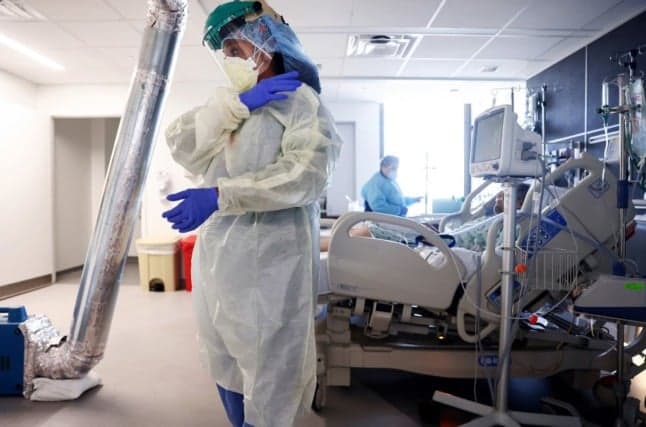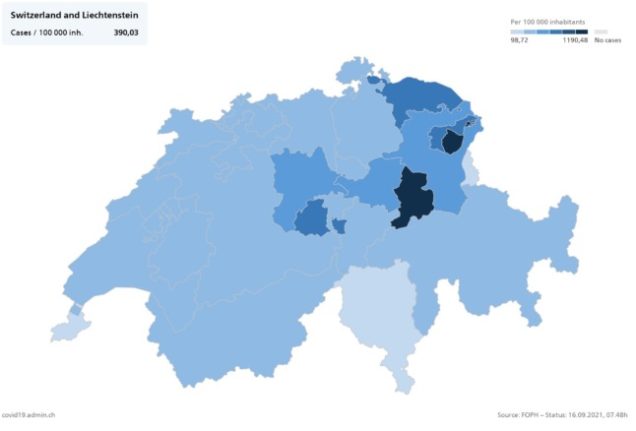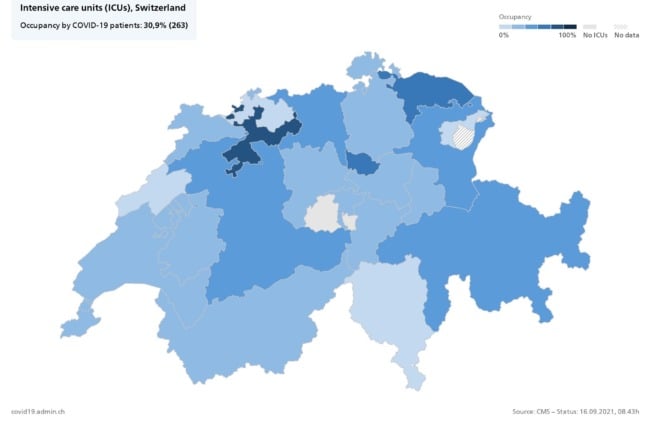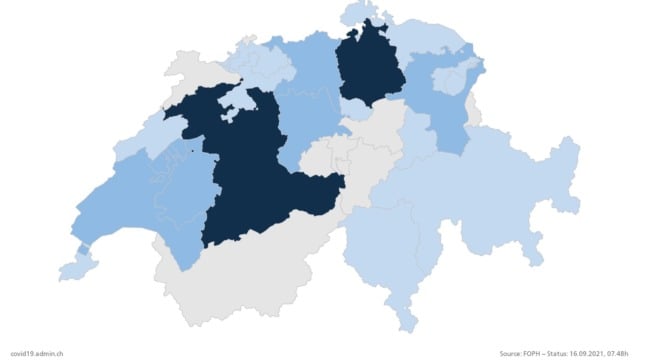Vaccinations to hospital numbers: How the Covid situation is evolving in Switzerland

There is (relatively) good news and bad news on the Covid front in Switzerland. This is what you should know about both.
Let’s start with the positive news first.
For the past several days, the number of new daily infections reported in Switzerland dropped from more than 3,000 to 2,262 on Thursday.
The Federal Office of Public Health (FOPH) has not said whether this decrease is due to the higher vaccination rate recorded since the announcement of the Covid certificate extension, which went into effect on September 13th.
READ MORE: TODAY: Switzerland extends Covid certificate for entry to restaurants and bars
Where are most of these cases?
As this FOPH map shows, Appenzell Innerrhoden has the highest infection rate — 1190.48 per 100,000 inhabitants, followed by Glarus 1019. 96 / 100,000. Both cantons’ rate exceeds by far the national average of 390.03 / 100,000.
Six other cantons are above the national average as well: Obwalden (672.29), Appenzell Ausserrhoden (661.92) and Thurgau (657.13), Schwyz (523.43), Zurich (440.53) and Schaffhausen (425.03).

Hospitalisations
This is where the developments are less positive.
Unlike the number of cases, the number of beds in intensive care units occupied by coronavirus patients is not dropping.
Latest FOPH data indicates that 263 beds out of the total of 850 in Swiss ICUs are occupied by Covid patients — up from 183 one month ago. Nationally, this translates into an average of 30.9 percent, but some cantons have exceeded this number.
In Solothurn, for instance, 76.5 percent of ICU beds are occupied by coronavirus cases, 62.5 percent in Zug, and 57.1 percent in Thurgau.
However, these figures are likely higher “due to the different reporting times and procedures”, according to FOPH.

“Without the Covid, these beds would be occupied by other patients. In addition, while some patients only stay in intensive care for two or three days, those who are there because of the Covid stay 15 days on average. It’s a struggle for every bed”, said Urs Karrer, member of the Covid-19 Task Force.
But the impact of the increased number of cases extends far beyond the ICUs; all the other hospital services must be reorganised to accommodate Covid patients, taking vital resources away from other services.
“Currently, cardiologists and oncologists must help the Covid service. This means they can provide less care for patients with cancer or heart disease”, Karrer noted.
READ MORE: ‘A struggle for each bed’: How Covid admissions impact hospitals in Switzerland
Deaths
There are significantly fewer people dying from complications of coronavirus now than in the midst of the pandemic in spring and fall of 2020.
The numbers remain fairly stable, with slight increase in Bern and Zurich.

Vaccinations
The extension of the Covid certificate prompted increasing numbers of people to get their shots.
While on August 31st, only 50.92 percent of Switzerland’s population was fully vaccinated, that number crept up to 53.32 percent on Friday, according to FOPH.

It is still lower than vaccination rate in neighbouring countries, which exceeds 60 percent, but health officials hope the pace of inoculations in Switzerland will pick up within the next few weeks
Comments
See Also
Let’s start with the positive news first.
For the past several days, the number of new daily infections reported in Switzerland dropped from more than 3,000 to 2,262 on Thursday.
The Federal Office of Public Health (FOPH) has not said whether this decrease is due to the higher vaccination rate recorded since the announcement of the Covid certificate extension, which went into effect on September 13th.
READ MORE: TODAY: Switzerland extends Covid certificate for entry to restaurants and bars
Where are most of these cases?
As this FOPH map shows, Appenzell Innerrhoden has the highest infection rate — 1190.48 per 100,000 inhabitants, followed by Glarus 1019. 96 / 100,000. Both cantons’ rate exceeds by far the national average of 390.03 / 100,000.
Six other cantons are above the national average as well: Obwalden (672.29), Appenzell Ausserrhoden (661.92) and Thurgau (657.13), Schwyz (523.43), Zurich (440.53) and Schaffhausen (425.03).

Hospitalisations
This is where the developments are less positive.
Unlike the number of cases, the number of beds in intensive care units occupied by coronavirus patients is not dropping.
Latest FOPH data indicates that 263 beds out of the total of 850 in Swiss ICUs are occupied by Covid patients — up from 183 one month ago. Nationally, this translates into an average of 30.9 percent, but some cantons have exceeded this number.
In Solothurn, for instance, 76.5 percent of ICU beds are occupied by coronavirus cases, 62.5 percent in Zug, and 57.1 percent in Thurgau.
However, these figures are likely higher “due to the different reporting times and procedures”, according to FOPH.

“Without the Covid, these beds would be occupied by other patients. In addition, while some patients only stay in intensive care for two or three days, those who are there because of the Covid stay 15 days on average. It’s a struggle for every bed”, said Urs Karrer, member of the Covid-19 Task Force.
But the impact of the increased number of cases extends far beyond the ICUs; all the other hospital services must be reorganised to accommodate Covid patients, taking vital resources away from other services.
“Currently, cardiologists and oncologists must help the Covid service. This means they can provide less care for patients with cancer or heart disease”, Karrer noted.
READ MORE: ‘A struggle for each bed’: How Covid admissions impact hospitals in Switzerland
Deaths
There are significantly fewer people dying from complications of coronavirus now than in the midst of the pandemic in spring and fall of 2020.
The numbers remain fairly stable, with slight increase in Bern and Zurich.

Vaccinations
The extension of the Covid certificate prompted increasing numbers of people to get their shots.
While on August 31st, only 50.92 percent of Switzerland’s population was fully vaccinated, that number crept up to 53.32 percent on Friday, according to FOPH.

It is still lower than vaccination rate in neighbouring countries, which exceeds 60 percent, but health officials hope the pace of inoculations in Switzerland will pick up within the next few weeks
Join the conversation in our comments section below. Share your own views and experience and if you have a question or suggestion for our journalists then email us at [email protected].
Please keep comments civil, constructive and on topic – and make sure to read our terms of use before getting involved.
Please log in here to leave a comment.